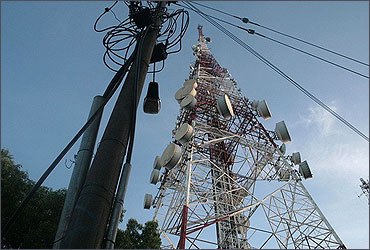Surajeet Das Gupta in New Delhi
Telecom operators - new as well as established ones - will benefit as a draft of the national telecom policy for 2011 proposes trading, pooling and sharing of spectrum.
The policy is also pushing for a one-country-one-licence regime, which means removal of roaming charges.
Experts say most new operators such as S-Tel, Datacom, Loop Telecom and Etisalat-DB will be keen on trading or sharing spectrum as their spectrum utilisation is minimal because of a low subscriber base.
They will have demand from established operators who have not got the go-ahead on their applications for more spectrum.
Click on NEXT for more...
Telecom policy to allow pooling of spectrum
The draft has also suggested restructuring of the Department of Telecommunications (DoT) for a separation between its policy making functions and licensing powers. Currently, it is the final authority on both issues.
The draft policy has been circulated within the DoT, with a request for modifications or updates by the top officials involved in the process.
The draft policy has set up some key targets for the telecom sector: it will ensure the availability of 300 Mhz of spectrum for future IMT (like 3G and 4G) services by the year 2016 and 500 Mhz by 2020.
Click on NEXT for more...
Telecom policy to allow pooling of spectrum
It also envisages broadband access through optical fibre to all village Panchayats by 2014.
The target is to get the rural telecom density to hit 100 per cent by 2020 (from 35 per cent currently).
The draft policy has also incorporated the need for making frequencies available for new technologies in the telecom space.
A five-year road map on this will be finalised. The policy is also open to allowing the sharing of both passive as well as active networks between operators.
The policy has also suggested a relook at the existing spectrum administration.
It has suggested that a new comprehensive 'Spectrum Act' be put in place, which should put in place a statutory mechanism for spectrum management and licensing.
Click on NEXT for more...
Telecom policy to allow pooling of spectrum
At present, spectrum management functions are carried out by the Wireless Planning & Coordination (WPC) wing under various provisions of the Indian Telegraph Act and the Indian Wireless Telegraph Act.
In the absence of a legal mechanism, the WPC wing relies increasingly on the mechanism of administrative decisions and orders to manage spectrum.
That has led to some controversial decision making.
The draft has also pushed for giving out mobile virtual operator (MVNO) licences to resellers who do not have spectrum of their own but buy bulk minutes from operators.
Click on NEXT for more...
Telecom policy to allow pooling of spectrum
Considering that there are still various categories of licences - UASL, national long distance (NLD), international long distance (ILD) and VSAT, among others, the draft envisages their convergence.
The policy suggests two separate categories of licences: a network service provider and an end-user service provider licence.
The former may be licences to set up and maintain networks required for various types of services.
The latter may be licences to deliver specific services such as data and value-added content, among others.







article